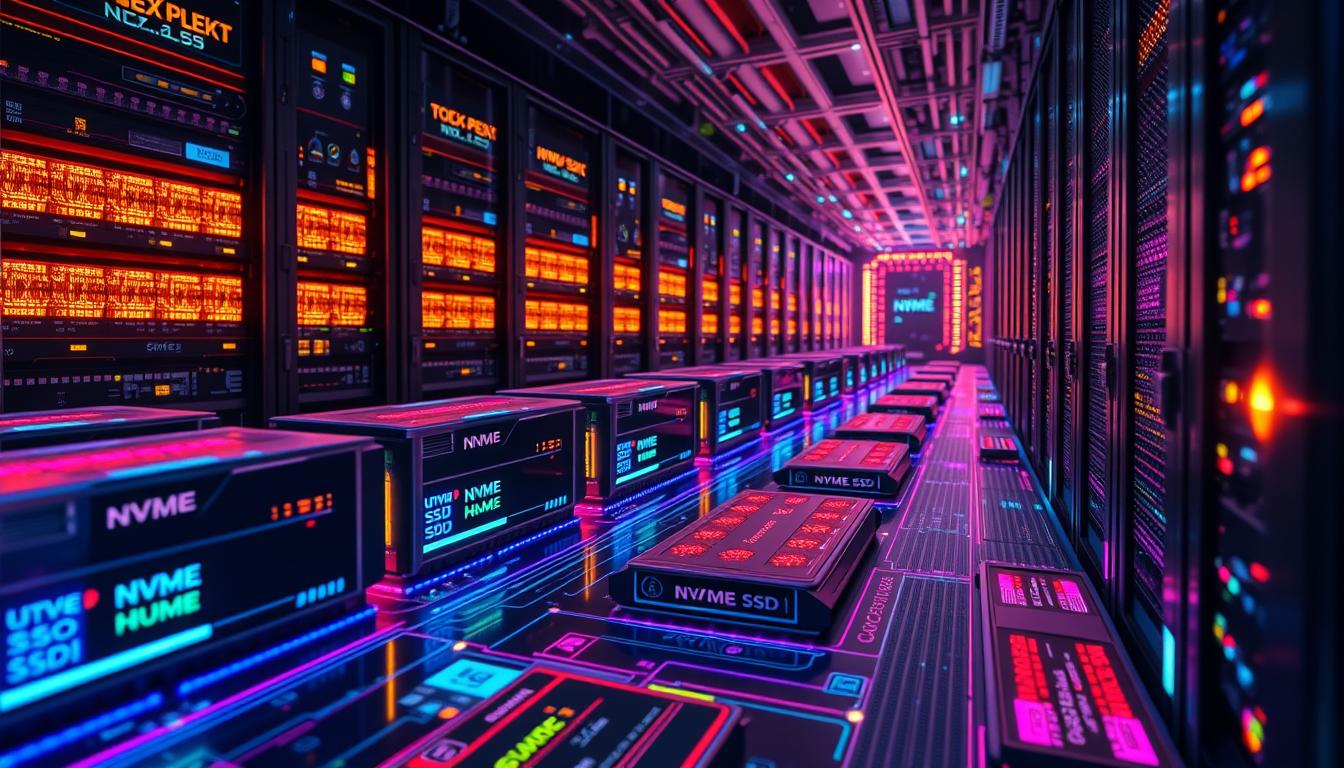Did you know the world is expected to generate over 180 zettabytes of data by 2025? That’s a mind-boggling amount! And a big chunk of this growth comes from technologies like blockchain and cryptocurrency, which absolutely rely on super-fast, secure storage to function.
That’s where NVMe SSDs come in. These aren’t your average storage drives; they’re built for speed and reliability. Think of them as the high-performance engines needed to keep blockchain networks running smoothly and growing effectively. Let’s dive into why they’re becoming so crucial.
Here’s the Lowdown:
- NVMe SSDs deliver the blazing speed and solid reliability that blockchain and crypto need to thrive.
- Using NVMe helps blockchain networks scale up, handling more transactions without slowing down.
- NVMe storage boosts the security and decentralization that make blockchain and crypto so innovative.
- Picking the right NVMe SSD and setting it up correctly can seriously level up system performance.
- Real-world examples show NVMe SSDs are already shaping the future of DeFi and distributed ledgers.
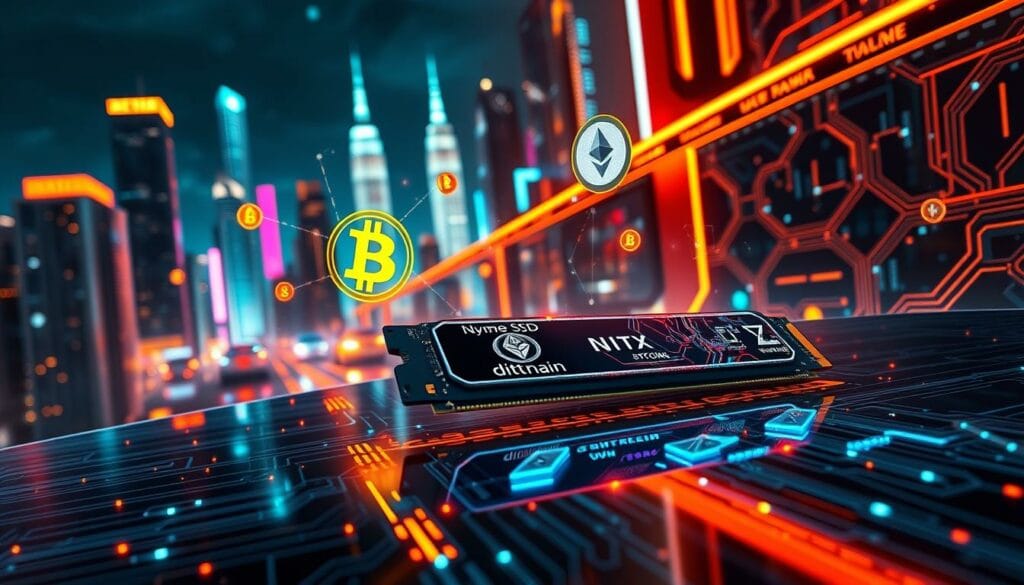
Blockchain and Crypto’s Growing Appetite for Storage (2024 & Beyond)
Blockchain tech and cryptocurrencies are exploding in popularity. As we move through 2024, their need for powerful storage solutions is only getting bigger. Guess what’s stepping up to the plate? You got it – NVMe SSDs.
With more decentralized apps (dApps) and DeFi platforms popping up, the data piles up fast. Companies jumping into this space are quickly realizing they need the kind of performance NVMe SSDs offer just to keep up.
It’s not just about the core networks, either. Things like edge computing and the Internet of Things (IoT) are also driving demand. These setups need fast, local data handling, and NVMe SSDs are perfect for processing data right where it’s generated, quickly and efficiently.
| Metric | 2024 Projection |
|---|---|
| Demand for NVMe SSDs | A significant jump, thanks to the heavy storage needs of blockchain and crypto. |
| NVMe Adoption in Blockchain/Crypto | Many businesses in these sectors will be using NVMe SSDs, especially for edge computing and IoT. |
| Storage Capacity Needed | Expect a huge surge in demand for storing blockchain network data and transaction histories. |
Bottom line? By 2024 and beyond, NVMe SSDs won’t just be nice-to-have; they’ll be essential for the growth, speed, and smart data management of the blockchain and crypto world.
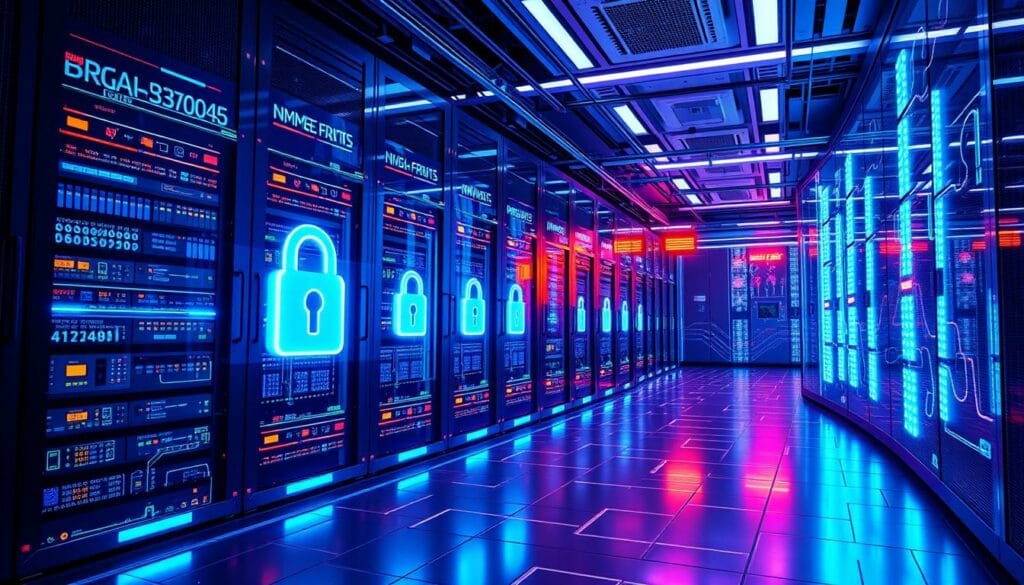
NVMe SSDs vs. Old-School Storage: Why Blockchain Needs the Upgrade
The fast-paced world of blockchain demands storage that can keep up. Traditional hard drives or even older SATA SSDs? They’re often just too slow for the job. NVMe (Non-Volatile Memory Express) SSDs are the new champions, offering massive advantages.
The market numbers tell the story: NVMe SSDs are projected to rocket from a $44.6 billion market in 2020 to $163.5 billion by 2025! Why the boom? Because NVMe delivers the speed modern tech needs. Think about online shopping – retailers love NVMe because it handles data efficiently, making everything faster for you.
So, how do NVMe drives crush traditional storage for blockchain?
- Speed: Much faster data access.
- Low Latency: Less delay in fetching data.
- More IOPS: Handles more operations per second.
This translates directly to faster transaction processing and networks that can handle more users (better scalability). Plus, NVMe drives often take up less physical space and can be more power-efficient, potentially saving costs in the long run.
It’s no surprise companies are flocking to NVMe. Over 80% of data today isn’t simple text – it’s documents, images, videos. Add in AI, big data analysis, and blockchain itself (used in fields like healthcare, defense, and transport), and you see why fast storage is critical.
But, let’s be real – switching isn’t always painless. There can be concerns about data security during migration, the initial cost can be higher, and getting teams up to speed on the tech takes effort.
Despite these hurdles, the benefits usually outweigh the challenges. As blockchain technology keeps evolving, NVMe SSDs are becoming the go-to for handling data quickly and efficiently.
Supercharge Your Blockchain Transactions with NVMe
With blockchain and crypto moving at lightning speed, having high-performance storage isn’t just an option – it’s a must. Companies are increasingly choosing NVMe SSDs to kick their blockchain transaction speeds into high gear and improve overall system performance.
What makes NVMe so good for blockchain? It’s designed for speed and can handle tons of data simultaneously. By using NVMe storage, blockchain networks can:
- Process transactions much faster.
- Improve network security (faster consensus).
- Potentially use less power and generate less heat compared to older, slower systems working harder.
Reliability is another huge factor. As blockchains grow, they need storage that won’t quit under pressure, handling vast amounts of data and transactions without a hiccup. NVMe SSDs are built tough for this kind of demanding work.
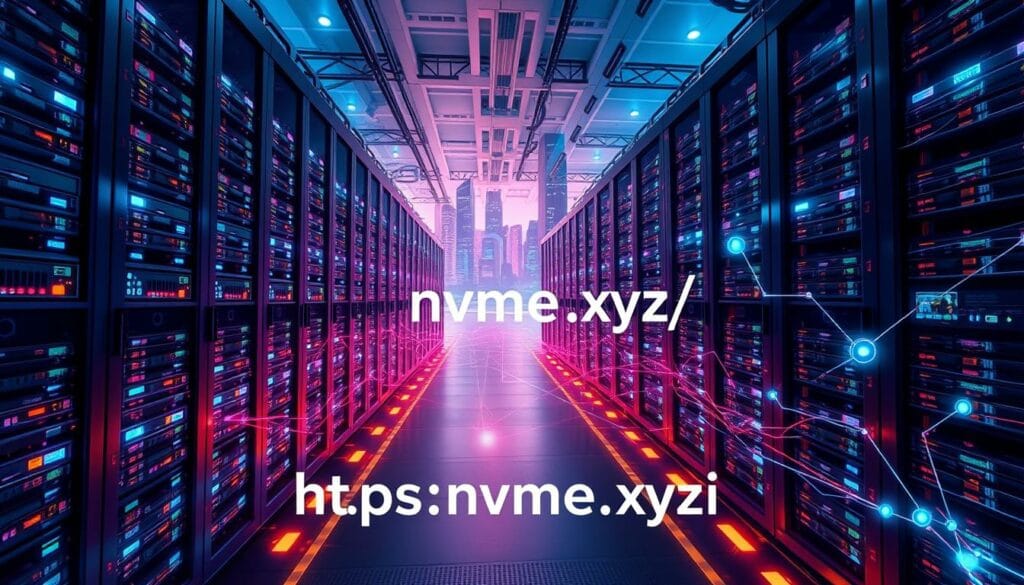
NVMe also tackles common blockchain headaches like slow confirmation times and high transaction fees. Faster storage means faster processing, which can help alleviate these bottlenecks. Developers can build more responsive and efficient blockchain systems, meeting the ever-growing demand for decentralized technologies.
| NVMe Feature | Benefit for Blockchain |
|---|---|
| Low Latency | Quicker transaction validation and processing times. |
| High Throughput | Can handle massive amounts of data and many transactions at once. |
| Reliability | Keeps the network stable and resilient. |
| Power Efficiency | Can lead to lower energy costs and less heat output. |
As blockchain continues its march forward, NVMe storage will be front and center, enabling faster transactions and the scalability needed for widespread adoption.
How NVMe Boosts Scalability and Performance in Blockchain Systems
NVMe technology is becoming a cornerstone for building robust blockchain infrastructure. Why? Because blockchain needs speed, security, and decentralization – and NVMe helps deliver on all fronts, especially when it comes to handling growth.
NVMe’s secret sauce is its low latency (less waiting) and high throughput (more data moving). This makes it ideal for the demanding nature of blockchain networks. The market growth predictions for NVMe underline just how vital it’s becoming.
Newer versions of the NVMe standard are even better, improving how data is accessed and shared across networks. For blockchain, this means smoother performance, the ability to handle more users and transactions (scalability), faster transaction confirmations, and overall greater network capacity.
NVMe also plays well with other advanced hardware. For example, combining NVMe SSDs with powerful processors like Xilinx UltraScale+ FPGAs can significantly accelerate blockchain operations – things like reaching consensus faster, executing smart contracts quicker, and managing data storage more efficiently.
As blockchain applications become more complex and widespread, the performance and scalability advantages of NVMe will be even more critical. Choosing the right NVMe setup is key to building blockchain systems ready for future demands.
“NVMe’s ability to deliver low latency, high throughput, and efficient parallel processing makes it an ideal choice for powering blockchain networks.”
In short, NVMe isn’t just fast storage; it’s a key enabler for building scalable, high-performance blockchain networks ready for tomorrow’s challenges.
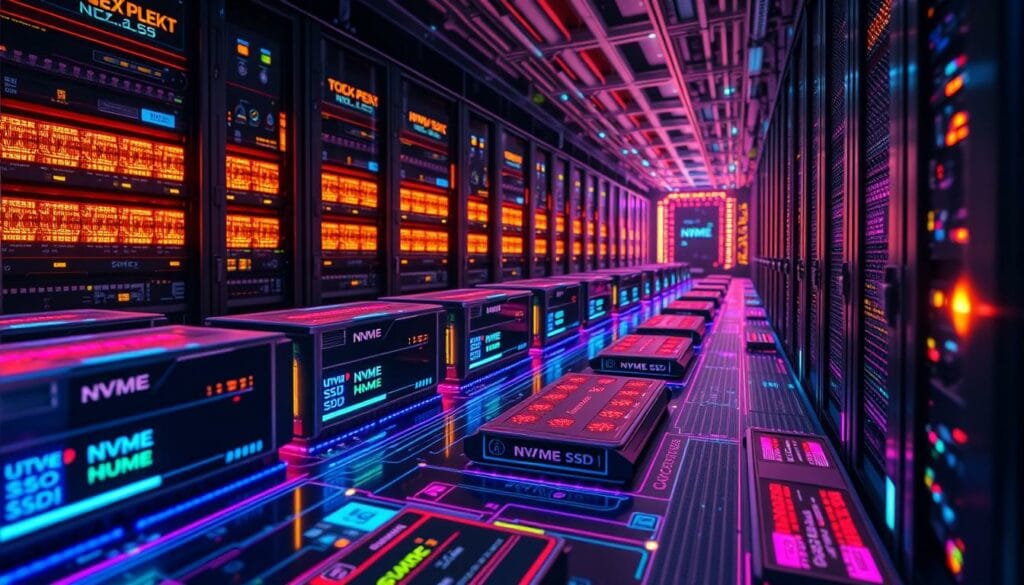
Picking the Perfect NVMe SSD for Your Blockchain Needs
Okay, so you’re sold on NVMe for your blockchain or crypto project. But how do you choose the *right* drive? While NVMe offers incredible speed, there are a few specific things to keep in mind, especially around power and heat.
Power and Heat: NVMe drives generally use more power and can get hotter than older storage types. This is the price of performance! But you can manage it. Some NVMe modules use fewer PCIe lanes (the connection pathway to the motherboard) which can cut down power draw and heat without sacrificing too much speed for many applications.
Board Design Matters: The physical layout of the circuit board where the NVMe drive sits is important. High-speed signals like those used by NVMe need careful design to maintain signal integrity (keeping the data clean) and timing. Good design prevents errors and ensures reliable, fast data transfer.
Heatsinks are Your Friend: Many NVMe drives come with or support adding heatsinks. These help dissipate heat, keeping the drive cool and performing optimally, especially under heavy blockchain workloads.
| Consideration | Benefit |
|---|---|
| Reduced PCIe Lanes (if suitable) | Lower power use and less heat generated. |
| Heatsinks | Better temperature control for consistent performance. |
| Careful Electrical Design | Ensures data transfers are reliable and fast. |
By thinking through these points – power needs, heat management, and ensuring good hardware design – you can select and implement NVMe SSDs that truly accelerate your blockchain operations and boost overall system efficiency.
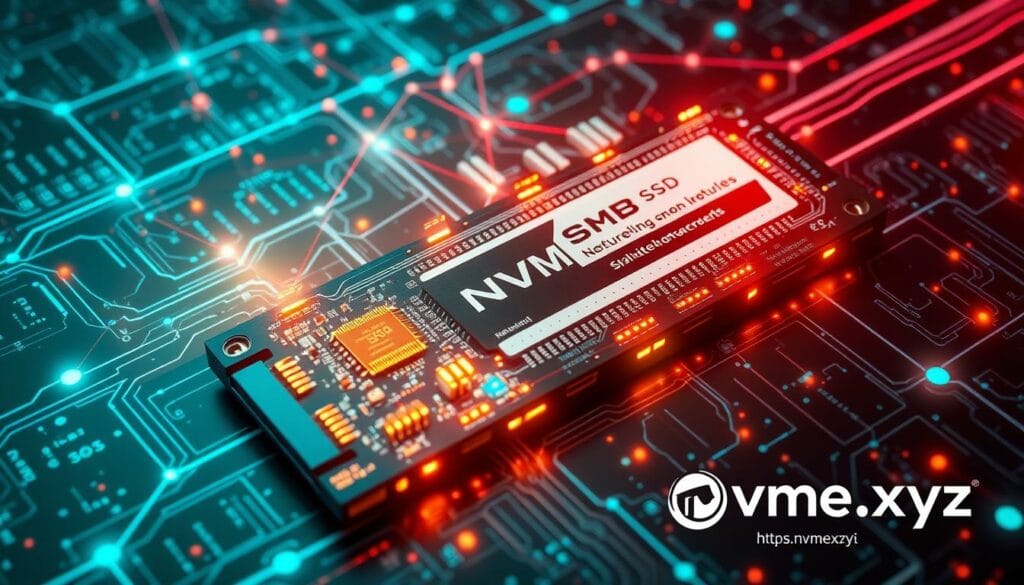
Fine-Tuning Your Storage Setup for Blockchain Workloads
As blockchain technology keeps expanding, getting your storage configuration right is absolutely critical. NVMe SSDs are the go-to choice now because their speed and low latency blow older options out of the water. Compared to traditional SATA SSDs, they offer:
- Higher capacity options
- Often better power efficiency per unit of performance
- Greater reliability under heavy use
But just plugging in an NVMe drive isn’t the whole story. Optimizing your setup involves smart choices:
- Leveraging New Tech: Look into SSDs using newer NAND flash technologies like 3D NAND and QLC (Quad-Level Cell). These can offer great performance and capacity, sometimes at better price points.
- Smart Data Management: Techniques like data deduplication (storing duplicate data only once) and compression (shrinking data size) can save valuable storage space and reduce costs, making your system more efficient.
It’s also vital to match the NVMe SSD to the specific *type* of blockchain work you’re doing. Some applications might need extreme endurance (lots of writes), while others prioritize raw read speed. Understanding your application’s profile helps you pick the most cost-effective drive that still delivers top performance.
Real-World Wins: NVMe SSDs in Action
Let’s look at how NVMe is making waves. While some studies focus on specific areas like security protocols in cars, a broader trend is clear in data centers: SSD adoption is soaring. SSD sales hit $32 billion in 2020, a 22% jump, largely driven by the need for the speed and capacity that NVMe delivers.
Companies like Broadcom showcase NVMe’s power through their high-speed Ethernet adapters (supporting up to 400G!) combined with technologies like RoCEv2. This combo delivers the low latency and high throughput essential for demanding tasks like machine learning, large-scale storage, and, yes, blockchain operations. Faster networks mean faster block validation and transaction processing.
As blockchain continues its rapid evolution, smart use of NVMe SSDs is becoming essential for building faster, more scalable, and more efficient systems. Choosing the right tech helps companies stay competitive in this dynamic field.
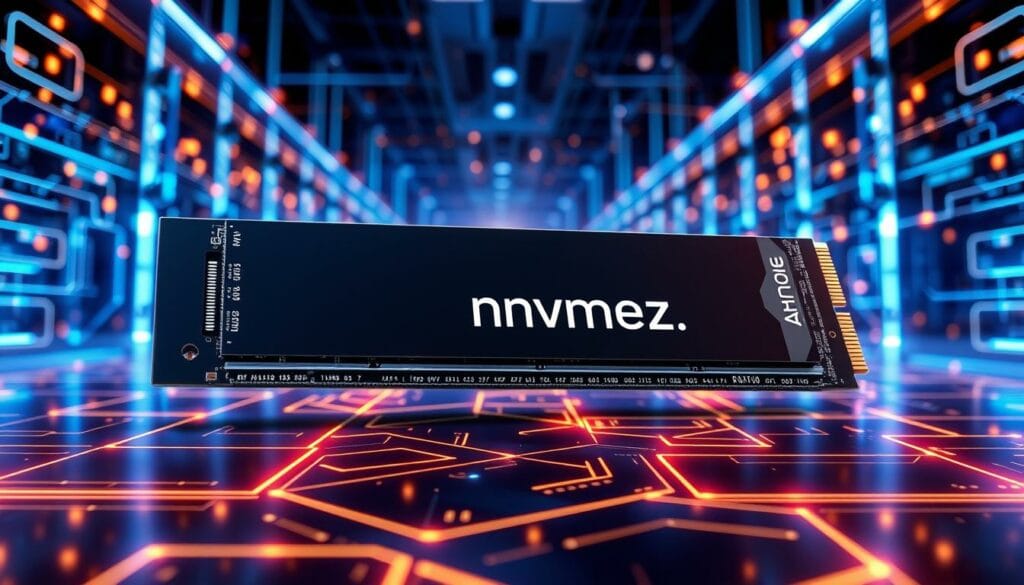
Case Studies: NVMe SSDs Boosting Blockchain & Crypto Apps
The blockchain and crypto industries are hungry for speed and scale, and NVMe SSDs are stepping up to feed that hunger. Forget sluggish old hard drives; NVMe is the new standard. Let’s see how it’s making a real difference.
Boosting Transaction Speed and Scalability
NVMe SSDs are critical for making blockchain transactions fly and allowing networks to grow without grinding to a halt. Think about network hardware providers like Broadcom – their Ethernet gear supports speeds from 1G all the way up to 200G and 400G! Combined with tech like RoCEv2 (which cuts down delays), this creates the super-fast pathways needed for:
- Quickly processing blockchain transactions.
- Validating and confirming blocks much faster.
- Handling many more transactions simultaneously (scalability).
Broadcom even mentions performance boosts of up to 5x for certain applications thanks to efficient on-chip processing – exactly what demanding blockchain platforms need.
Keeping Data Safe and Sound
Blockchain isn’t just about speed; it’s about trust and security. Data storage needs to be rock-solid. NVMe SSDs offer reliability, and when paired with robust networking (like Broadcom’s broad Ethernet portfolio supporting speeds from 1G to 400G), you get a dependable foundation.
NVMe drives are built for endurance, fitting the constant read/write cycles of many blockchain applications. Compatibility across major operating systems also makes integrating these reliable storage solutions easier.
Smart Storage Setups
One size doesn’t fit all. Choosing the right storage setup is key. NVMe SSDs come in different form factors, capacities, and endurance ratings, letting you tailor the storage to your exact needs. Companies leading in networking and storage often emphasize security, power efficiency, and thermal management, especially at high speeds – all crucial factors for blockchain infrastructure.
By carefully selecting NVMe SSD models and network components (like adapters supporting speeds from 1G to 400G), organizations can build storage systems perfectly matched to their current needs and future growth.
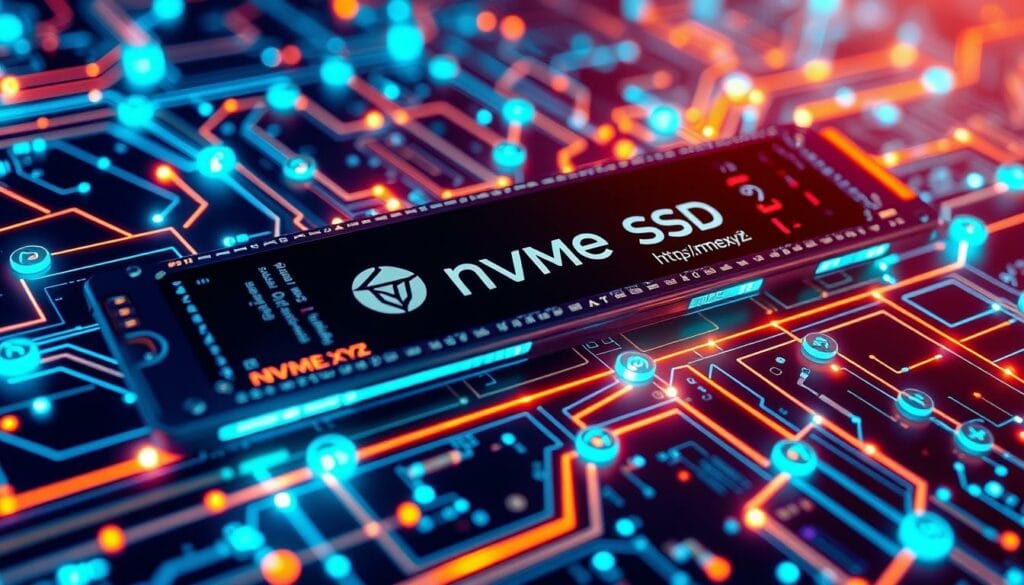
What’s Next? NVMe, Decentralized Storage, and the Future of Blockchain
The blockchain and crypto space never stops evolving, and its storage needs are growing right along with it. While NVMe SSDs are solving today’s performance challenges, what does the future hold? It likely involves a combination of cutting-edge tech, including NVMe and decentralized storage platforms.
The market for next-gen data storage is booming – expected to grow significantly (around 6.73% CAGR from 2023-2029). This is fueled by the sheer volume of data being created everywhere. NVMe SSDs are central to this shift, offering the speed, scalability, and efficiency required.
At the same time, decentralized storage solutions are gaining traction. Platforms like Filecoin or Storj use blockchain principles to create secure, resilient, and often cheaper storage by distributing data across a network of independent nodes worldwide. This approach aligns perfectly with the decentralized ethos of many blockchain applications.
Imagine combining the raw speed of NVMe for active data processing (“hot storage”) with the resilience and potential cost savings of decentralized platforms for long-term storage or backups (“cold storage”). This hybrid approach could offer a powerful, scalable, and robust storage architecture for the future of blockchain.
Industry discussions, like those focusing on Ethernet-connected storage and flash technologies, show the continuous drive for better solutions. It’s clear that adapting to changing workloads and leveraging the best of both centralized (like NVMe in servers) and decentralized technologies will be key.
NVMe SSDs have already profoundly impacted blockchain and crypto, delivering tangible improvements in performance, scalability, and security. By embracing NVMe and exploring synergies with emerging decentralized solutions, organizations can build the powerful infrastructure needed to stay ahead in this fast-moving digital frontier.
FAQ
What are the main storage needs for blockchain and crypto in 2024?
How are NVMe SSDs better than traditional storage for blockchain?
What should I look for when choosing an NVMe SSD for blockchain?
How can NVMe storage make my blockchain setup better?
Source Links
- NVMe for Machine Learning, IoT, Blockchain Workloads – https://www.calsoftinc.com/blogs/nvme-important-new-age-data-center-workloads.html
